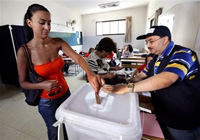Lebanon doomed to remain a dummy in USA’s political games
The pro-Western March 14 coalition won the parliamentary elections in Lebanon on June 7. The coalition received 71 of 218 seats in the parliament, whereas the March 8 block chaired by Hezbollah won 57 seats. The previous parliament of the country had exactly the same landscape four years ago.

The system of elections in Lebanon – the country that used to be considered as “the Pearl of the Middle East ” – is quite peculiar. There are 26 election constituencies in the country. Each of them has an official representing one of the nation’s religious groups, who is entitled to run for elections competing with other spokespeople for the same religious group only. A Shiite official, for instance, can be a rival only to another Shiite in their constituency.
The system is connected with a very complicated confessional structure of Lebanese citizens. About 60 percent of the country’s population are Muslims; about 40 percent represent various branches of Christianity. Fifty percent of deputy mandates are provided to Muslims – Sunnis, Shiites, the Druze and the Alavite sects. The other half is distributed between the Christians – the Maronite, the Orthodox and the Catholics.
Many observers pointed out the significant growth of inter-confessional opposition on the threshold of the elections. The Lebanese still give first priority to their religious rather than the national affiliation. By the way, all eleven candidates from Hezbollah will have their seats in the new parliament of Lebanon .
Najib Mikati, a businessman, who chaired the interim government four years ago as a result of the so-called cedar revolution, has biggest chances to take the office of the prime minister. It is worthy of note that the West actively supported the leaders of that revolution in the country.
All observers said that there were many violations made during the elections in Lebanon. Vote collectors would publicly bribe electors promising up to $2,000 for the “correct” ballot. Parties would pay for the transportation of thousands of people who returned to their motherland to take part in the vote.
As a matter of fact, the political situation remains the same. Conflicts will continue to tear the nation apart. Several foreign politicians arrived in Lebanon to express their own views about the future of the nation. It seems that Lebanon is doomed to remain the object of political games of the West.
US Vice President Joe Biden arrived in Lebanon 16 days before the elections to support the nation’s government in its struggle against Hezbollah. The US guest wanted the pro-Western forces, which came to power in the country four years ago, to keep their positions.
The 2005 parliamentary elections in Lebanon ended with the victory of Saad Hariri’s followers. They received the support from the United States and Saudi Arabia . The politician’s father, Rafik Harirr, the former Prime Minister, was assassinated shortly before the vote. Syria’s troops that were deployed in the country for 29 years were withdrawn soon afterwards. Biden said that Lebanon was moving in the right direction, that is why the USA was ready to provide the military assistance to the country.
US Secretary of State Hillary Clinton visited Beirut in April. Hezbollah’s followers said that Clinton interfered into Lebanon’s internal affairs when she urged the nation to hold open and honest elections.
Israel added more fuel to the fire of the pre-election struggle. Lebanese President Michel Suleiman stated that Israel intended to incite the confessional strife in the nation with the help of its spies. He described espionage against Lebanon as the continuation of Israel ’s policy of terror and aggression and said that Israel still wanted to split the nation.
Suleiman personally congratulated the officers of Lebanese special services with their successful operation to detect the secret network of foreign agents. Over 35 people, including top military officials, have been detained in Lebanon during the recent months. All of them acknowledged that they were working on the Israeli intelligence.
Vladimir Anokhin
Pravda.Ru
Subscribe to Pravda.Ru Telegram channel, Facebook, RSS!




